News
Teachers Become Students at BTI’s Curriculum Development Projects
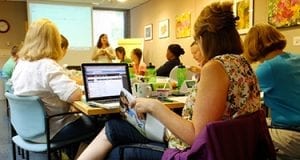 Fourteen teachers arrived from schools as close as Ithaca and as far as Anaheim, Calif. to attend the BTI Plant Biology Curriculum Development Projects (CDP) teacher institute July 13-17, to begin their year-long journey to translate plant research into classroom learning opportunities for middle and high school STEM students across the country.
Fourteen teachers arrived from schools as close as Ithaca and as far as Anaheim, Calif. to attend the BTI Plant Biology Curriculum Development Projects (CDP) teacher institute July 13-17, to begin their year-long journey to translate plant research into classroom learning opportunities for middle and high school STEM students across the country.
They learned about advanced topics, such as genome editing and biofuel-generating photobioreactors and test drove laboratory exercises designed for use in their classrooms back home. The weeklong intensive course begins a continuing collaboration with BTI staff, which supports participants with classroom visits, new curricula, equipment, materials and access to a network of scientists and educators who are all passionate about plants.
Creating a professional development program that brings together researchers and teachers in meaningful ways is something that BTI’s Director of Education, Tiffany Fleming, is equally passionate about.
“This year the CDP program emphasized how plant research and biotechnology can play important roles in creating more sustainable systems. We also focused on demonstrating ways that teachers and students could get involved in this research in their own classrooms,” said Fleming.
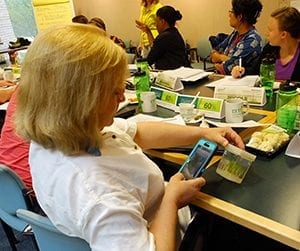 The laboratories present current plant science issues and research topics to students, such as breeding pest-resistant crops and creating biofuel from green algae. Teachers spent time in the BTI teaching laboratory designing their own experiments to investigate natural variation in plants, culturing algae in water bottle “bioreactors,” germinating switchgrass seeds in conditions with different pH levels and observing caterpillars fed on different varieties of corn.
The laboratories present current plant science issues and research topics to students, such as breeding pest-resistant crops and creating biofuel from green algae. Teachers spent time in the BTI teaching laboratory designing their own experiments to investigate natural variation in plants, culturing algae in water bottle “bioreactors,” germinating switchgrass seeds in conditions with different pH levels and observing caterpillars fed on different varieties of corn.
“The labs are designed to be open-ended, so that teachers and students learn to design experiments as they learn about BTI’s research. For example, some teachers designed experiments to test the algae’s ability to tolerate salt, while others investigated the effects of carbon and temperature on algal growth. By the end of the week we were able to draw some new conclusions about optimizing algal growth for bioenergy based on our own evidence,” said Fleming.
Teachers also enjoyed tours of the greenhouses and laboratories at BTI and visited the MacDaniel Nut Grove, a five-acre forest farming site on the Cornell campus.
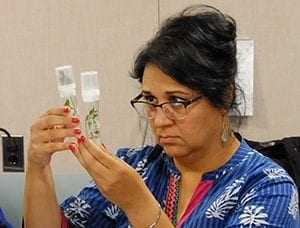 “I love the hands on activities. It’s all very practical. It’s all resources that I can acquire and use in my class,” said Alecia Redway, a New York state Master Teacher who teaches classes on living environments for 8th graders at PEARLS Hawthorne School in Yonkers, NY. “I also love the tours because we get to see the application and the scientists working. I took pictures so I could share with my students that ‘you can be this person in a few years, and this is what you need to do to achieve this goal.’”
“I love the hands on activities. It’s all very practical. It’s all resources that I can acquire and use in my class,” said Alecia Redway, a New York state Master Teacher who teaches classes on living environments for 8th graders at PEARLS Hawthorne School in Yonkers, NY. “I also love the tours because we get to see the application and the scientists working. I took pictures so I could share with my students that ‘you can be this person in a few years, and this is what you need to do to achieve this goal.’”
BTI faculty, postdocs and graduate students also play an active role in the institute by giving lectures on their work and providing insight into the advances and aims of modern-day plant research. BTI scientists and educators will also visit participants’ classrooms to talk with students about careers in plant science and assist them in lab activities based on BTI research.
“Knowing the research is really beneficial because it’s allowing me to come up with good questions to ask the kids, to get them thinking,” said Sue Verbeck, a life science teacher at Pine Grove Middle School in East Syracuse, NY. She chose the institute because of her personal interest in biofuels and the usefulness of the institute’s topics.
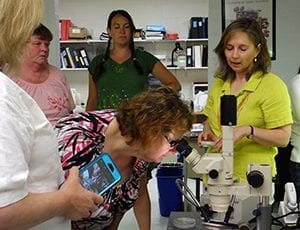 “Genetics is something that’s very difficult to teach—I teach 7th grade—and it’s very abstract,” said Verbeck. She appreciated that the CDP institute provides concrete examples of genetics, as well as opportunities to make the topic more relevant to the students’ daily lives.
“Genetics is something that’s very difficult to teach—I teach 7th grade—and it’s very abstract,” said Verbeck. She appreciated that the CDP institute provides concrete examples of genetics, as well as opportunities to make the topic more relevant to the students’ daily lives.
The CDP institute even assigns the teachers homework. By Friday afternoon, the teachers have developed a plan for how to integrate the new curricula into their existing classroom plans, which they present to the group.
“We are encouraged to take this back to our classrooms, which is something that I think teachers are always looking for,” said Bhawna Chowdhary, a STEM Biosciences and Math Integration teacher at Niagara Falls High School, in Niagara Falls, NY. “Part of the reason that I’m here is because I get to design a good chunk of our curriculum and one of our units is sustainability, which is enriched and driven by external partners such as the Boyce Thompson Institute at Cornell University. This is a nice tie-in to get resources that are very current and relevant to students’ lives.”
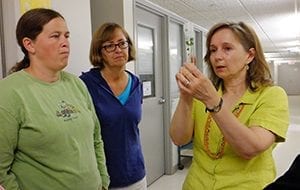 After the program ends, BTI educators continue to collaborate with teachers and provide them with new classroom activities, laboratory materials and opportunities to share their data with scientists and other classes.
After the program ends, BTI educators continue to collaborate with teachers and provide them with new classroom activities, laboratory materials and opportunities to share their data with scientists and other classes.
“Several citizen-science projects are underway and will continue into the 2015-16 school year. We are looking forward to drawing on the data students generate,” said Fleming.
Athena Theodoris, a teacher at Manhattan International High School who teaches a living environment curriculum to a mixed class of 10th and 11th grade students, attended the 2012 CDP institute. In her previous position at International High School in Brooklyn, NY, she used multiple BTI curriculum projects with her students, who were all foreign born students, primarily from China, Uzbekistan, Mexico and countries in South America. Her students have germinated mutant grass seeds to looks for strange effects in the resulting plants, which they report back to BTI researchers, and have grown switchgrass in their class garden for a biofuels project.
“My students really enjoyed the projects, especially growing the different grasses and recording our observations that we sent to the scientists,” said Theodoris.
“They also enjoyed the switchgrass lab that we did in class and actually took it one step further and based on the switchgrass lab we did in class, they also did a science fair project.”
At her previous school, she shared the curricula with a fellow biology teacher and plans to pass it along to her colleagues next year at her new school. She also intends to share the curricula with the “Green Team,” a group that educates people on recycling and other best practices to help the environment.
“Overall, it’s an amazing program. I hope I will have an opportunity to participate again,” said Theodoris.
Subscribe to BTI's LabNotes Newsletter!
Contact:
Boyce Thompson Institute
533 Tower Rd.
Ithaca, NY 14853
607.254.1234
contact@btiscience.org
Copyright © 2023 | Boyce Thompson Institute | All rights reserved | Privacy Policy | Cookie Policy


